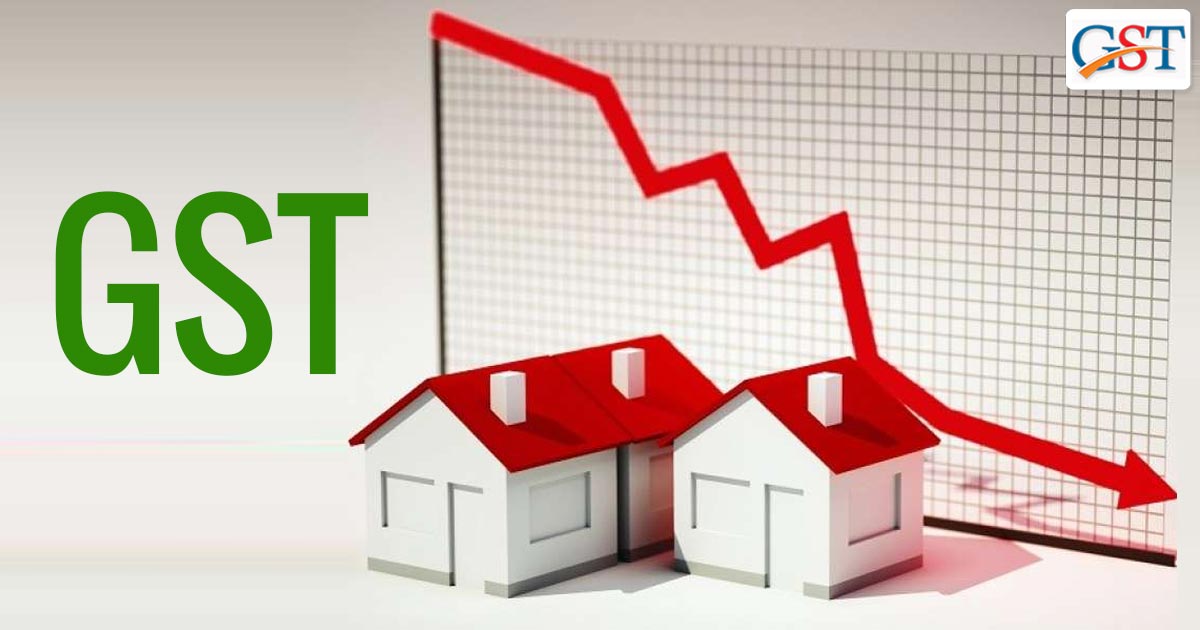Challenges in the real estate sector post-GST implementation

Before GST there used to be multiple taxation systems prevalent in the country. Tax rates used to vary from state to state, further complicating the taxation regime. The implementation of the GST regime in India is one of the major reforms aimed at simplifying the complicated tax system and making one tax applicable throughout the country under the ‘One nation, one Tax’ initiative. However, the real estate industry, which is a key player in the Indian economy, encountered several obstacles after the implementation of GST. Real estate contributes 6-7% of the total GDP of the country. The GST rates for real estate are 5% for residential properties and 18% for commercial properties. Developers under input tax credit (ITC) under the GST system, claim a tax credit for the GST they have paid on goods and services. This ultimately results in lower prices of the construction which ultimately results in lower property prices.
How GST is applied in Real Estate sector
Two main aspects of GST applicability in real estate are the goods aspect i.e. applicable GST on various construction materials and the services aspect i.e. the activity of construction itself. Result of both these aspects is the final cost of the property. The total GST applicable is calculated by adding the SGST (state GST) and CGST (central GST), thus 18% GST = 9% SGST + 9% CGST. 12% GST = 6% SGST + 6% CGST and so on. Different rates are applicable on different construction materials like Building bricks 5%, Roofing tiles 5%, Marble/Granite blocks 12%, Portland/Slag Cement 28% etc. Construction services also feature different taxes like Under construction properties under Credit Linked Subsidy Scheme 8%, Under construction properties (excluding those under Credit Linked Subsidy Scheme) 12%, Composite supply of works contract for affordable housing 12%, Works Contract (other than govt. bodies) 18% etc.
Registration and Stamp Duty
Registration and stamp duty are still applicable to real estate even post GST implementation. These charges are different in different states and may also vary from part to another part within the same state itself. These stamp duty and registration charges are applicable to both constructed and under construction properties, while GST is only applicable to under construction properties.
GST on transfer of development rights (‘TDR’)
TDR is when the owner of the land transfers the development rights of land to the Developer to construct the building. In return, the Landowner either takes money or a part of constructed property. This arrangement between the landowner and the developer is being treated as ‘service’ to attract GST. This has again left the developers in dollema since GST is not applicable on immovable properties and land here is immovable property. The definition attached to General Clauses Act, 1897 provides that “immovable property” includes land, benefits to arise out of land, and things attached to the earth, or permanently fastened to anything attached to the earth. TDR is a benefit arising out of the land and hence it is an immovable property.
Transfer of Floor Space Index (FSI)
FSI is actually a permission granted by the concerned authority for undertaking construction on any land, with a view that the construction does not exert weight on ground beyond a specific limit. FSI is the maximum permissible limit on a land on which a structure can be built. FSI permission is sought by the developers from the concerned authorities i.e. local municipal authorities. GST is levied on the grant of FSI by the authorities since the permission is treated as a ‘service’. This GST cost is in addition to the fees paid to these authorities to obtain permission. Sometimes permission is to be obtained from multiple authorities leading to increased financial burden on developers.
Input tax credit (‘ITC’)
It is a mechanism wherein the developers can claim the amount of GST paid on goods and services. If a property or part of property is constructed for the sole purpose of undertaking commercial activities, then GST paid out of the revenue generated and ITC is not allowed on the procurement cost of construction goods. Hence, the landowners who construct shops on their land or part of land for the purpose of business activities like shops, salons, hotels, guest houses, theaters etc. will have to pay GST on the revenue generated out of such activity. They will not be allowed to claim their amount as ITC. This matter was decided by the Orissa High Court in the case of M/S Safari Retreats Private Limited [2019 (25) G.S.T.L. 341 in favour of thePetitioner is engaged in carrying on business activity of constructing shopping malls for the purpose of letting out. The petitioners in this case were engaged in construction of shopping malls for the purpose of letting out to different customers. They were not allowed to claim ITC by the Revenue on construction material and consultancy services on the ground of section 17 (5) (d) of the CGST Act (Non availability of ITC on goods or services for construction of immovable property other than Plant & Machinery). Court held that Section 17 (5) (d) of the CGST Act has to be interpreted in continuity of the transaction since rent income is arising out of the property which is constructed after paying GST on different items. If ITC is denied on a building meant and intended to be ‘let out’, it would amount to treating the transaction as identical to a building meant and intended to be ‘sold’ which is contrary to the basic principles of classification of subject matter of tax levy and, therefore, violative of Article 14 of the Constitution. By relying on the judgment of Eicher Motors Ltd. and another versus Union of India and others, (1999) 2 SCC 361, court held that the credit is intended to give benefit to the assessee, this is the very intent of credit.
Therefore, if the Petitioner is being made to pay GST on the rental income arising out of the land on which he had paid GST already, he is eligible to claim input tax credit on the GST.
Some of the changes faced by the real estate sector post-GST implementation are discussed in this article.
Certain tax benefits and exemptions were enjoyed by the real estate sector under the pre-GST regime. However, post GST implementation, most real estate transactions came under the GST net, which increased the tax burden of developers and buyers. The property prices thus went up. Additionally, real estate players had to get accustomed to the new GST compliance requirements like filing the returns at regular intervals, maintaining detailed records, and keeping up with severe time deadlines. This created additional administrative burden and compliance costs for developers, particularly for the small players who did not have the resources and the expertise.
Certain positive parts of the GST regime ultimately cause negative impacts. For instance, one of the key benefits of GST is that a person or entity can claim input tax credits (ITC) on various inputs used in construction. However, it is very challenging to avail these credits because of the complex nature of projects and the involvement of multiple stakeholders, such as contractors, suppliers, and service providers. Each of these stakeholders charges GST on their supplies, and the developer is eligible to claim ITC on the GST paid to them. However, getting proper tax invoices with GST details from all the parties is difficult because of the multiple levels of sub-contracting involved. Real estate projects usually comprise residential as well as commercial units each of which attract different ITC rules under GST. Handling of the land-related costs such as stamp duty and registration charges under GST brings in complexities and differing interpretations on the applicability of ITC. Failure of the suppliers or contractors to comply with the GST requirements, such as non-payment of taxes or issues with invoicing, can result in no ITC being granted to the developer, making the matter even more complicated.
Moreover, the tax authorities lately have been constantly putting scrutiny on various real estate developers over non-compliance of the GST. They are being summoned and show cause notice have been issued. A leading developer in Mumbai has been served multiple show cause notices for non-payment of GST on certain transactions and incorrect availing of input tax credits.
The implementation of GST has given rise to a set of new issues entertained by consumer forums. In a landmark case, Homebuyers filed complaints against developers for not passing on GST benefits. As a consequence, the National Consumer Disputes Redressal Commission (NCDRC) directed the real estate company to refund the excess GST collected from homebuyers, along with interest.
Lack of Clarity of GST provisions
Although GST is not levied on the immovable property but even after the completion of property till Occupation Certificate (OC) is received, GST will be levied because it will be considered as ‘Construction Services’.
The redevelopment of cooperative housing societies (CHS) have been tangled in a complex web of issues related to GST giving rise to legal disputes. There have been several appeals made to the finance ministry to streamline the tax mechanism and provide clarity for stakeholders. CHS are societies wherein members collectively transfer their development rights to a redeveloper who undertakes construction and delivers new flat in exchange for the old one. The redeveloper takes permission for the additional Floor Space Index (FSI) to construct additional flats for sale. With this he recovers money which enables him to offer new flats to the original members without cost. GST is being levied to CHS at 18% which will be applicable to the sale of flats after acquiring project completion certificate. This will not only make the construction cost expensive but will be transferred ultimately to the buyers. Thai will affect the entire real estate market because the prices of affordable housing will go up.
Reforms required for ease of doing business
Difficulties faced by this sector have made it apparent that GST reforms are required. Hence, the GST structure should be simplified considering different types of work involved in the real estate sector. Real estate sector should be consulted to understand the challenges they face and the possible outcomes that can ease the process for them. GST reforms must ensure that the process of claiming ITC is simplified at each stage. It must be understood that the real estate sector requires efficient flow of financial resources to undertake its business. When these finances are stuck, it causes severe difficulties. When GST is charged, a large amount of money is stuck which is to be claimed via ITC. Sometimes the amount of GST paid is more than the tax which the company would have paid. The complexities of ITC makes it challenging to claim this money back. Hence, the GST regime should be amended to achieve the purpose for which it has been implemented i.e. simplification of tax structure and reduced burden on businesses and consumers.
Conclusion
Main intent behind the introduction of GST in Real Estate was to make housing affordable by crediting back the tax (GST) paid by the developers by disallowing tax burden to be transferred on the ultimate customers. However, in scenarios where different GST rates are applied to different items and types of construction activities along with no return of tax via ITC leaves developers in a vulnerable situation to either bear the tax burden themselves and suffer loss or transfer it to customers and make housing non affordable. Real estate sector is filled with complexities due to different projects and involvement of multiple stakeholders. Hence, availing benefits of the post GST regime remains a challenge for many developers in real estate sectors.
Effective collaboration between the government, industry bodies, stakeholders, consumer forums, and judiciary remains critical to addressing the challenges and unleashing the full potential of the sector towards making a meaningful contribution to the nation’s economic progress. The sector should be consulted while framing policies which will be applicable to them. A detailed analysis of the type of work undertaken, parties involved in each stage, challenges faced by the sector etc should be done and incorporated in policies. GST was introduced for the simplification of the earlier complex tax structure which is a welcome step, some of the provisions of the GST can be amended to effectively apply to specific sectors like Real Estate where the scenario is different from other businesses.
By entering the email address you agree to our Privacy Policy.



